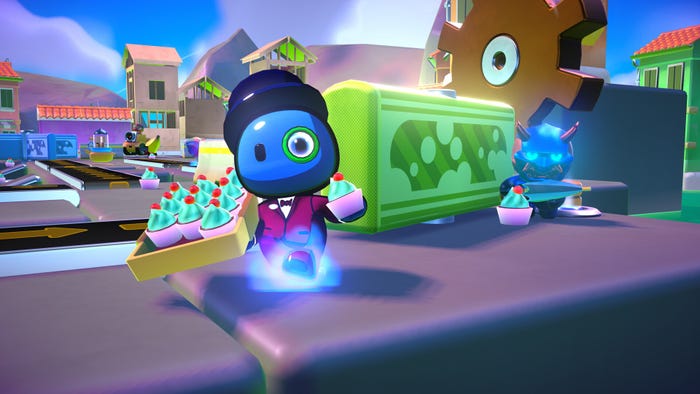“I compare RPG Maker to a pencil. With a pencil there are techniques to learn, but compared to the other writing tools, it’s the most simplistic one. But you can still create elaborate works with it.”

“I always compared RPG Maker to a pencil. With a pencil there are still techniques to learn, but compared to the other writing tools, it’s the most simplistic one, but you can still create elaborate works with it.”
Kan Gao, director and designer of the sleeper hit indie adventure title To The Moon and the upcoming sequel Finding Paradise, has demonstrated the remarkable versatility of RPG Maker, utilizing RPG Maker XP to create moving games with some truly heart-wrenching moments. Now working on his sixth game using the tool, the developer finds himself creating some gameplay moments within it that push the limits of what RPG Maker can do.
What draws him back to keep using RPG Maker after all of these years and games? Why not branch out and try another engine? Why stick with it when some of the play he intends for Finding Paradise will be difficult to program in it?
“It’s still, at the end of the day, a tool. It’s just a matter of whether it’s the right tool. The most efficient tool,” says Gao.

The initial draw
"I came across RPG Maker, and it had the capacity for just a single person to essentially bring a story to life."
Fiction and narrative have been a draw for Gao for a long, long time. They have always been the major focus of his work, and coming to games has always been another means of telling the stories in his mind, but with an added immersion for players to truly feel the story that unfolds.
“Initially, I was really just making an interactive story," says Gao. "That was over a decade ago. At the time, I was thinking of text adventures. Choose-your-own-adventure kind of games. Because that’s pretty much all I thought one person could do with game development at the time.”
Gao didn’t see any way to make a complex game all by himself, and so it wasn’t even an option he was considering. Then, he happened to stumble across RPG Maker, and a new world opened up to him. “I was writing those wannabe novels at the time and I was trying to make them come to life in some ways, either through choice or through music," he says. "But then, I came across RPG Maker, and it had the capacity for just a single person to essentially bring a story to life.”
What did Gao feel during his first experience with it? “It was a sense of wonder, really," he recalls. "It was like I was opening up to creating my own world. I had no idea that such a tool existed. I was thinking the high tech means of making things at the time would have just been text adventures – adding choices to the narrative. This opened up a whole new world for me.”

“Just to be able to see a character walking on the screen – that was quite exciting for me at the time,” he continues.
"You go in there and you can draw a map right away, and you can put existing characters on there – it really gives a feeling of accomplishment. It’s a highly motivating tool for beginners to get rolling."
It was that quick line from idea to execution – to going from plunking some data into RPG Maker and then being able to have an actual video game character walking around on-screen in such a short time – that gave Gao the confidence to continue in game development in a more complicated way than he’d initially expected.
“Honestly, I think when I started with RPG Maker at the time, had it not had all those resources – you go in there and you can draw a map right away, and you can put existing characters on there – it really gives a feeling of accomplishment. Especially to someone who hasn’t had that much experience with game making to begin with.” says Gao.
Game development is a daunting idea to many prospective developers. Code can be frightening. Even when it isn’t, it can take a long time to see any sort of result for the budding creator, and it’s then that doubt and uncertainty settle in. It takes a great deal of willpower to create a game, or even a part of a game that can give an appreciable, visible sense of accomplishment.
But RPG Maker could give Gao that instant feeling of gratification by cutting down the time between creating and seeing a part of a game come together. Just seeing a character moving on a map he had created in moments would fuel him to continue, giving him that sense of success that would keep him motivated. “Had it not been for that, I don’t think I would have stuck with it. It’s a highly motivating tool for beginners to get rolling.”

RPG Maker a decade later
Gao is no longer a brand new developer needing a shot of confidence to keep him going, but even so, he still continues to use RPG Maker to powerful effect. Why would he stick with this tool rather than move onto something (arguably) more complex that would allow him to do other things with games?
“For what I do, it hits the sweet spot in terms of effectiveness and efficiency,” says Gao. The tool does what Gao needs of it for his stories, and also, little reason to run the risk of working with something that would bog him down with learning how to use the tool, rather than just worrying about telling his story.
“That’s something I’m afraid of," he admits. "I see a lot of cases where very-talented developers are dragged down by the act of creating their own engine or using something that’s beyond their scope. For certain games, sure, it’s unreasonable to use RPG Maker, but for what I do, it does all I need it to do, for the most part, while still making it feasible to finish at a relatively efficient pace.”

"My mentality shifted from learning what the engine can do, and then creating what I can make with it, to something like finding what I want to do first, and how the engine can make that happen."
It also doesn’t hurt that RPG Maker touches on those familiar gaming experiences from the developer’s youth. “It sort of has to do with the kind of game I grew up on, which are top-down RPGs,” says Gao. "At the same time, I always wanted to direct narratives with the most versatile means, and RPG Maker simply suited that."
“Adventure games, on the other hand – the sideways platformer-ish perspective – for me, doesn’t offer as much versatility with the camera angles and perspectives and stuff as far as storytelling goes. But maybe it’s just that I didn’t grow up with them as much (laughs). It’s something as shallow as visual style that’s kept me to it.” he continues.
It was more than just a look that Gao had pleasant memories of. After years working with the tool, Gao has become so comfortable with it that it has shifted his thought process as a developer.
“Once I got more experience with RPG Maker, it kind of just grew more natural to keep with it.” says Gao. “The biggest change over time was how I felt about the engine and game making in general as I got more experience with RPG Maker. My mentality shifted from what the engine can do, and then creating what I can make with it, to something like finding what I want to do first, and how the engine can make that happen.”

Gao, through years of growing more comfortable with RPG Maker, no longer found that his story was constrained by the limitations of the engine. He no longer had to ask himself what he was capable of doing with the engine, and then letting that guide his story, but instead could write a story how he wished, then figure out how he could make the engine do what he wanted. RPG Maker was fully under his control, and not something that would limit him.
That’s not to say that RPG Maker has unlimited potential for the developer. There are still some things that aren’t all that easy to do with it, but Gao finds these things to be interesting challenges rather than roadblocks, now. “There definitely is a lot of limitation with RPG Maker, because sometimes to make more advanced stuff you have to go through hoops. At the same time, I think creativity is fostered by limitations. In doing so, you actually discover a lot of things. It kind of leads you to all of these different mentalities of what you can do. I think, in some ways, that’s a good part.” says Gao.
After years of working with RPG Maker, Gao was comfortable enough with it to make it do what he wanted, and is creating some surprising play moments in Finding Paradise using that expertise. Despite its limitations, it is still the pencil in the hand of a master, now, able to create striking art through the developer’s skill, and was welcoming enough in the beginning to make the developer pick it up.

Advice to beginners
"RPG Maker has all of these resources to get you started. But this is also something that significantly limits someone’s vision. When you are presented with all of these convenient things, we tend to, almost subconsciously, go in the direction of least resistance."
Gao has a few thoughts on where beginners may have difficulties with RPG Maker in the beginning, and how best to avoid them.
“Where things often go wrong with people who try RPG Maker (and it happened to me too, initially, and it takes a while to get out of) – is it’s really a double-edged blade. It has all of these resources to get you started. This is also something that significantly limits someone’s vision. When you are presented with all of these convenient things, we tend to, almost subconsciously, go in the direction of least resistance.” says Gao.
“So, when we’re presented with all of these convenient packages and resources, it leads the narrative in certain directions. It’s only when we’re more practiced with the engine and we realize that we can’t close our eyes – we don’t have to use these convenient resources that they have, or feel that we can’t use other things – and must shift our focus from what the engine has to what we want.” he continues.
When RPG Maker offers so many prepackaged elements, developers can fall into a trap of seeing what the engine will do for them, rather than what they want the engine to do. This can cloud a budding developer’s vision for their work, skewing it subtly in directions they may not mean for it to go.

“I don’t mean that there’s anything wrong with folks using the existing resources, because you can still really do some amazing things with the existing tools, but oftentimes, it’s difficult to look at something and not go in that direction (laughs).” says Gao.
While cautioning against letting the engine alter your vision, Gao also wishes future developers to know how daunting, and yet exciting it can all be, hoping developers do let themselves get caught up in the joy of telling their stories through it, just as he felt when first playing around with it.
“I found it daunting. I was a teenager at the time, too. I think when we’re younger, it’s a lot easier to put a lot of time into it. At the time, it was a lot of fun to experiment. I enjoyed it, but it was definitely a lot to figure out, too.” says Gao.
About the Author(s)
You May Also Like








